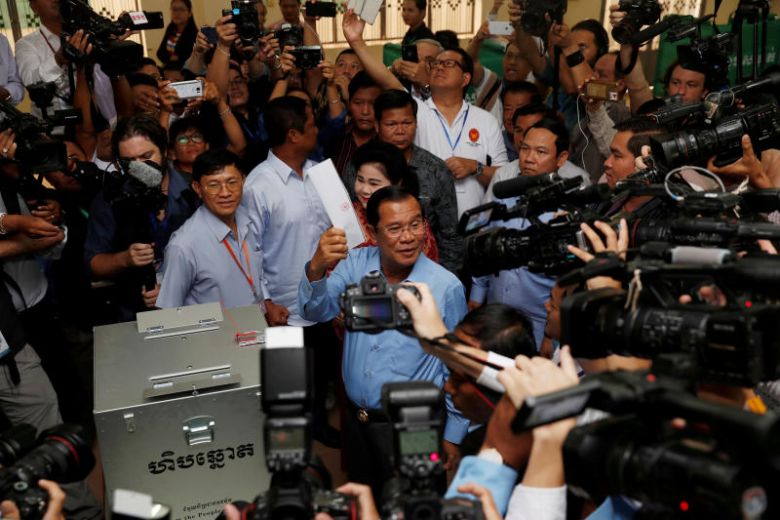Death of Democracy in Cambodia
July 30, 2018 | Expert Insights

The Cambodian People’s Party (CPP), headed by Prime Minister Hun Sen who ruled Cambodia for 33 years, won a landslide victory in the general elections.
However, the election was widely condemned by human rights groups and international political observers who said that the elections were neither free nor fair due to voter intimidation and the absence of any significant opposition to Mr. Hun Sen.
Background
Cambodia, also known as Kampuchea, is a country located in the Indochina peninsula in Southeast Asia. It is bordered by Thailand and Laos on the north and Vietnam on the east and south. The ancient Khmer kingdom, which built the monumental temple compound of Angkor Wat – a UNESCO World Heritage Site today, facilitated the spread of Hinduism and Buddhism across Southeast Asia.
The Khmer empire reached its apex in the 12th century. Following 400 years of decline, Cambodia became a French colony and during the 20th century experienced the turmoil of war, occupation by the Japanese, postwar independence, and political instability. During 1975 and 1979, Khmer Rouge’s period of power, at least 1.5 million Cambodians were killed or died, a monumental tragedy from which the country still suffers.
Over 4 million Cambodians participated in the May 1993 elections. Prince Ranariddh's Funcinpec Party was the top vote recipient with 45.5% of the vote, followed by Hun Sen's CPP and the Buddhist Liberal Democratic Party, respectively. A coalition government resulted between the Cambodian People’s Party and FUNCINPEC, with two co-prime ministers – Hun Sen, since 1985 the prime minister in the Communist government, and Norodom Ranariddh.
Last month, an investigation carried out by a research firm called FireEye has stated that a Chinese hacking team has penetrated computer systems belonging to Cambodia’s National Election Commission (NEC), opposition leaders and media in the months leading up to Cambodia’s July 29 elections.
Analysis
Hun Sen, a Khmer Rouge commander who defected, has ruled Cambodia for more than 30 years and is the world’s and Cambodia’s longest serving prime minister. In the general elections on 29th July, his party the CPP has won close to 100 of the 125 parliamentary seats.Mr. Hun Sen’s machinations to control the vote in the recent general elections was inevitable, but the real mystery, however, pointed at whether Cambodians were so deeply disenchanted with a rigged election that they would stay away from the polls or cast spoiled ballots.
Scenes on the ground in Phnom Penh painted a different picture than that presented by the government and the election commission. At a polling station in the capital, election workers outnumbered voters and a slow trickle of people arrived throughout the day.
In November, a Cambodian court with little reputation for judicial independence dissolved the Cambodia National Rescue Party that nearly unseated Mr. Hun Sen’s governing party in elections in 2013. Its leader, Kem Sokha, now sits in jail on treason charges, accused of plotting with the US to overthrow the government.
Sam Rainsy, a self-exiled former opposition leader who lives in France, said in a statement that the election would hand a “hollow” victory to Hun Sen.“A victory without contest is a hollow one,” he said.“For the first time in the 25 years since the elections organized by the UN in 1993, Cambodia lacks a legitimate government recognized by the international community,” he added.
Various independent news media outlets that once reported on government corruption and crony impunity have been silenced over the past year. Websites that carried negative portrayals of Mr. Hun Sen and his Cambodian People’s Party were blocked on the eve of Sunday’s vote.NGOs from the West, which had raised funds for a downtrodden Cambodia have also been shunned.
ASEAN Parliamentarians for Human Rights said the elections were taking place in a “highly repressive political environment”. Moreover, the White House in a statement said it would consider steps, including an expansion of visa restrictions placed on some Cambodian government members, in response to “flawed elections”. The US government in the recent past levied sanctions on a high-ranking official close to Hun Sen.
Adding to this, the EU has threatened Cambodia with economic sanctions.Opposition leaders have welcomed the White House statement and hoped others would follow suit.The CNRP also called on the international community to reject the result of the election.Unofficial election results are expected in mid-August, with official results due in September.
Counterpoint
Cambodia’s National Election Commission (NEC) said in a statement that voter turnout was 82.71%. “This is the success of the election,” Sik Bun Hok, chairman of the NEC, said in a televised news conference. 8.3 million people were registered to vote on Sunday.“This time is higher,” he added comparing the turnout in 2013 elections.
Assessment
Our assessment is that the state of democracy in Cambodia is eroding under the unfair circumstances in which the general elections were held. We feel that an intervention carried out by the UN and other major powers will aid in bringing electoral and political reforms in the country. We believe that democratic institutions need to be empowered in Cambodia and further a government that will facilitate the growth of its economy and human capital is the need of the hour.








Comments